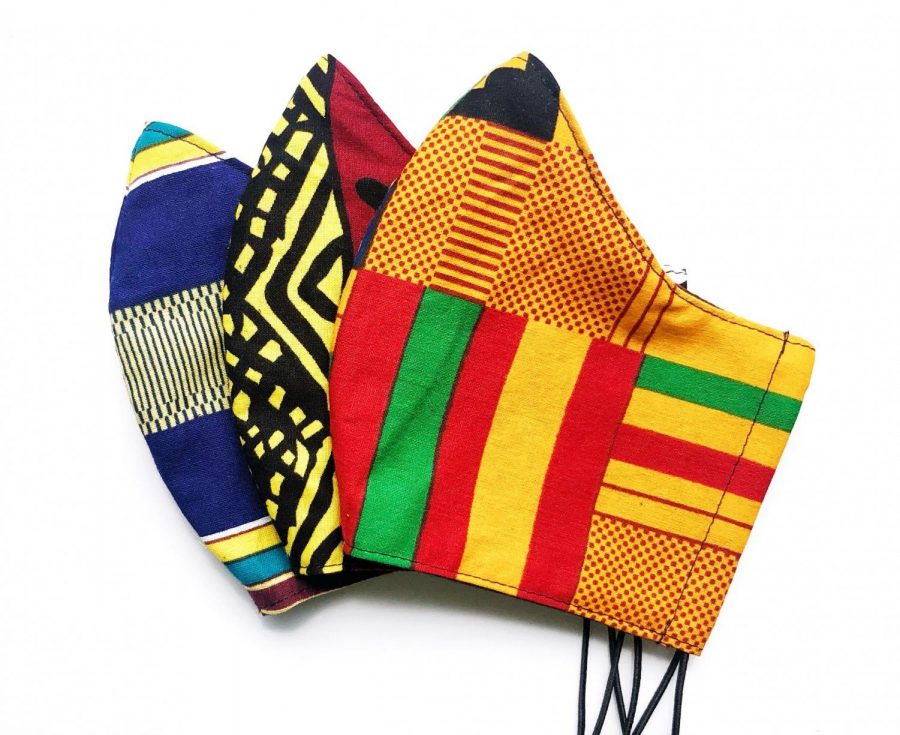SchnelleCares masks sewn for a larger purpose, serves local Black community
A group of hand-sewn, custom masks from SchnelleCares.
July 15, 2020
With the continued rise of COVID-19, masks remain an essential part of everyday life. For Schnelle Shelby of SchnelleCares, her hand-sewn, custom masks enable her to give back to her community.
Shelby started SchnelleCares in April by accident. As masks started to be mandated around the country, Shelby didn’t have any. Using her sewing skills, she began by making one for her fiancé.
“I wasn’t sure how the [mask] mandate would impact Black people. I didn’t want to be harassed for not wearing a mask,” Shelby said. “I wasn’t sure what exactly was going to happen, so I needed to make sure that I had a mask.”
After her fiancé posted his new hand-sewn mask on Facebook, requests from friends and family soon came pouring in, prompting Shelby to realize that her sewing skills could serve a greater good. Thus, SchnelleCares was born.
Her hand-sewn reusable masks are custom-made, non-medical grade and 100% cotton. Her line of cotton print masks – featuring fashionable animal prints, fruit designs and more – are made with quilting cotton for better breathability, she said.
Shelby also makes cotton masks with African and Batik prints, which pay homage to her heritage. With her mother’s Liberian roots and her father being African American and from the South, the prints almost blend the two cultures, she said.
“I think African print is beautiful,” Shelby said. “I like being able to have access to things that remind me of my culture, so that’s why I picked it.”
The sewing process is often evocative of her childhood, which reminds her of her mother, who she is separated from due to quarantine.
“When I think about growing up, hearing the hum of the sewing machine meant that my mother was at home,” she said. “When I’m sewing, it’s bringing me closer to my mom and providing me comfort at this time.”
While sewing these masks serve as a creative outlet for Shelby, her business also has deeper personal motivations, since her aunt died due to COVID-19.
“Considering that [COVID-19] is disproportionately impacting Black people, I wanted to make face masks and make sure they were going to people who look like me,” she said. “Black people are literally dying from [COVID-19].”
As someone who is big on community service, it was natural for SchnelleCares to give back to the community, Shelby said. When she first researched who was accepting cloth masks, she noticed a disparity among the types of organizations where these masks were being donated.
“I [noticed] that [certain organizations] were donating to predominantly white institutions, which is fine because everyone needs a mask,” she said. “But, someone needs to look out for Black people. I [thought], ‘I need to see if I can research places that are primarily in Black neighborhoods.’”
At first, a mask was donated for each mask purchased. Since SchnelleCares came into fruition, Shelby has donated close to 200 masks. While she has since decreased the number of masks she donates, the proceeds from her sales now go to local organizations that support the Black community like the Boston Resiliency Fund.
As Black Lives Matter protests continue around the country, support for Black-owned businesses has risen. The act of doing so, Shelby said, enables this country to move towards justice and equality.
“You have to support Black businesses because Black people are dealing with two pandemics: you have [COVID-19], and you have racism,” she said. “And, you have to be successful despite these two things, and the only way for that to happen is to support Black businesses.”
The Black Lives Matter movement, Shelby said, uplifts “the need for equity and equality for Black people” and “[dismantles] anti-Black racism in our public institutions and in our economy.” The movement – as well as the pandemic – helped influence Shelby’s decision of donating and giving back to the community.
“For me and for SchnelleCares, [this need] is why I have donated my time, money and product to Black and brown communities and to organizations that support Black and brown people, so that there can be equity; there can be equality; there can be justice,” she said.
Ultimately, supporting Black-owned businesses and promoting them through avenues like social media, Shelby said, is a form of allyship.
“I think it’s important for everyone to use their platform, to use their power, to share their power and even in some ways, to relinquish their power,” she said. “There are all kinds of ways that people can think out of the box to help create equity within Boston and within America.”
While masks are still a necessity and business is booming, post-pandemic, her next steps are unclear. However, as she continues to sew, Shelby’s tenacity and commitment to both her community and craft remain strong.
“I think everyone can find a role to play with resistance, and everyone can find a way to fit in,” she said. “For me, that’s through art, and that’s through my time.”
—
SchnelleCares masks are sold online only, and masks range from $14 to $16.
This story is a part of a series within the city section, which explores the stories of Black-owned small businesses surrounding Northeastern and throughout the Boston area.
Matt Yan can be reached at yan.matt12@gmail.com and on Twitter @yanmatt0.
This story was updated at 3:00 p.m. to reflect information regarding SchnelleCares’ affiliation with local organizations












